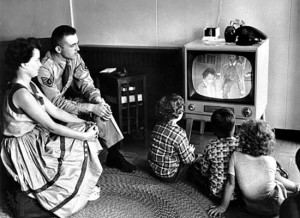Premiere Week Kick-Off: Is It What it Used to Be?
 Tomorrow Antenna will kick-off its second annual premiere week. For the next two weeks our contributors will be responding to the new shows introduced on the five broadcast networks. We will have one post for each network and we will be updating them in the afternoon the day after the shows premiere. We encourage all our readers and contributors to participate in the comments sections with their thoughts on the new shows.
Tomorrow Antenna will kick-off its second annual premiere week. For the next two weeks our contributors will be responding to the new shows introduced on the five broadcast networks. We will have one post for each network and we will be updating them in the afternoon the day after the shows premiere. We encourage all our readers and contributors to participate in the comments sections with their thoughts on the new shows.
While the team at Antenna and I are excited about the new premieres, as I am sure many of our readers are, I also find myself embarking on next week wondering…is the premiere season what it used to be? Like the political primary season, premiere season seems to be extending. While the CW has regularly introduced select shows before the main premiere week, this practice is expanding. This year both the CW and NBC are releasing multiple programs the week prior to the other networks. But more unusually nearly every network has already scheduled show premieres through October and November. Rather than mid-season replacements these are publicized fall premieres nearly a month or more after the main premieres.
ABC is introducing its duo of American masculinity programs in October with Last Man Standing and Man Up. This seasons two fairy tale inspired programs, NBC’s Grimm and ABC’s Once Upon a Time, are premiering towards the end of October. Fox’s new animated program Allen Gregory is also premiering in October and Fox’s new comedy I Hate My Teenage Daughter is being held until November. Only CBS and the CW are only introducing new fall shows in September, and CBS is only premiering one shows in October, Rules of Engagement – a show that appears to just be running out the clock to hit the magic syndication number. CBS has been a ratings leader and kept retained the most new shows from last years fall premieres, so it is unsurprising that they are keeping the most traditional schedule.
But what does it say about the other networks, who have significantly stretched the definition of “fall premiere.” Does it express a lack of confidence in the programs that are being held until October or November? Maybe, certainly Grimm and Once Upon a Time are slightly riskier genres and ABC’s (possibly regressive?) man-coms seem a bit of a departure for their core demo. It could also represent an investment in a programs success, by giving it the opportunity to garner more attention when it premieres. Certainly, Fox seems to have learned from Glee that experimenting with a shows introduction can be effective. By the time its sitcom New Girl makes it to air, it will have had several pre-air premiere venues as it was pre-released on iTunes, Hulu, and on-demand. Whether this will ultimately bring the show added buzz or decrease its ratings is yet to be seen but it is clear that Fox is ready to reconsider how to “premiere” a show.
Does this season represent a change in what Fall premiere season is? There is a strong argument to be made that traditional premiere seasons make less and less sense. Now networks are not only competing with one another’s new and returning shows but cable shows that are premiering, in progress, or reaching their finales. Viewers may pick up a show during its very first episode, when they try it out on Hulu during its fifth episode, or during reruns and can still go back and see it from the very beginning. Is the best way to give a good show a strong start still introducing it in mid to late September with all the other network shows. In a fractured, year round television schedule, are the changes we see this year to the premiere schedule only the beginning. What do you think Antenna Premiere Week will look like in 2020?



One additional consideration (you’ve hinted at it above) to build on your thoughtful jump-start to premiere week(s). As regular commentators and articles/posts have recently suggested, summer TV is not what it used to be. The months of re-runs and generally expected period of inactivity is no longer standard, which messes with our understanding – and subsequent anticipation – of seasonal viewing. The extension of premiering shows over a number of months seems to feed right into this. Indeed, how does this alter, re-construct, or manipulate (a strong word) our anticipation as well as any collective viewing practice and participatory culture that exists around a coherent and specifically temporal “premiere week”? Can we look at this simply as a strategy to keep the anticipation elevated for a longer period – a “premiere season” – or perhaps as a way to more evenly distribute hype across a year-round structure becoming less adherent to seasons? Either way, longevity and endurance keep coming to mind for me. Surely the economic strategies for stretching out the new stuff are also worth folding into our discussions.